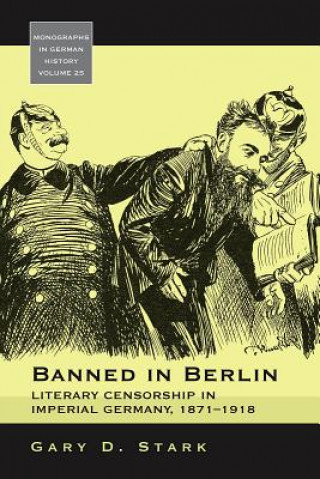
Kód: 04742630
Banned in Berlin
Autor Gary D. Stark
Stark has produced a lucid, thoroughly researched study of literary censorship in Wilhelmine Germany, i.e., the period from the founding of the Second Reich in 1871 to the end of WW I. Including an excellent bibliography, much of ... celý popis
- Jazyk:
 Angličtina
Angličtina - Vazba: Brožovaná
- Počet stran: 342
Nakladatelství: Berghahn Books, 2012
- Více informací o knize

1123 Kč

Skladem u dodavatele v malém množství
Odesíláme za 10-14 dnů
Potřebujete více kusů?Máte-li zájem o více kusů, prověřte, prosím, nejprve dostupnost titulu na naši zákaznické podpoře.
Přidat mezi přání
Mohlo by se vám také líbit
-

Napalmové sny
37 Kč
Darujte tuto knihu ještě dnes
- Objednejte knihu a zvolte Zaslat jako dárek.
- Obratem obdržíte darovací poukaz na knihu, který můžete ihned předat obdarovanému.
- Knihu zašleme na adresu obdarovaného, o nic se nestaráte.
Více informací o knize Banned in Berlin
Nákupem získáte 112 bodů
 Anotace knihy
Anotace knihy
Stark has produced a lucid, thoroughly researched study of literary censorship in Wilhelmine Germany, i.e., the period from the founding of the Second Reich in 1871 to the end of WW I. Including an excellent bibliography, much of it in German, and elegant illustrations with English translations, this book may be the final word on this subject. Highly recommended. Choice ...a thorough and absorbing study of literary censorship in imperial Germany...a succinct and scholarly account of 'repressive interventions' in the literary sphere. European History Quarterly Gary Stark has written a sophisticated and richly informative study of German censorship. The volume is not only a great introduction to the media and cultural production of Imperial Germany, but also a thoughtful primer on the general significance of censorship ...a marvellous book that should become a standard work in the historiography of Imperial Germany. English Historical Review Stark offers a convincing and differentiated picture based on wide ranging closely examined source material. Historische Zeitschrift Imperial Germany's governing elite frequently sought to censor literature that threatened established political, social, religious, and moral norms in the name of public peace, order, and security. It claimed and exercised a prerogative to intervene in literary life that was broader than that of its Western neighbors, but still not broad enough to prevent the literary community from challenging and subverting many of the social norms the state was most determined to defend. This study is the first systematic analysis in any language of state censorship of literature and theater in imperial Germany (1871-1918). To assess the role that formal state controls played in German literary and political life during this period, it examines the intent, function, contested legal basis, institutions, and everyday operations of literary censorship as well as its effectiveness and its impact on authors, publishers, and theater directors. Gary D. Stark is currently Professor of History and Associate Dean of Liberal Arts & Sciences at Grand Valley State University in Michigan. Previously, he was Professor of History, University of Central Arkansas (1994-1998) and Assistant and Associate Professor of History, University of Texas at Arlington (1975-1994), where he also held decanal positions. He is the author of Entrepreneurs of Ideology: Neoconservative Publishers in Germany 1890-1933 (University of North Carolina Press) and of numerous articles on late nineteenth and early twentieth century German cultural history. He co-edited with Bede K. Lackner, Essays on Culture and Society in Modern Germany (College Station: Texas A & M University Press, 1982).
 Parametry knihy
Parametry knihy
Zařazení knihy Knihy v angličtině Humanities History Regional & national history
1123 Kč
- Plný název: Banned in Berlin
- Podnázev: Literary Censorship in Imperial Germany, 1871-1918
- Autor: Gary D. Stark
- Jazyk:
 Angličtina
Angličtina - Vazba: Brožovaná
- Počet stran: 342
- EAN: 9780857453112
- ISBN: 0857453114
- ID: 04742630
- Nakladatelství: Berghahn Books
- Hmotnost: 486 g
- Rozměry: 230 × 163 × 19 mm
- Datum vydání: 01. January 2012
Oblíbené z jiného soudku
-

Hundred Years' War on Palestine
356 Kč -

Ethnic Cleansing of Palestine
378 Kč -

History of Japan
403 Kč -

Ten Myths About Israel
341 Kč -

Strange Death of Europe
433 Kč -

Decline and Fall of the Roman Empire
139 Kč -

Secret History
303 Kč -

God's Playground A History of Poland
1700 Kč -

Mayflower
388 Kč -

How to be a Victorian
302 Kč -

Plantagenets
356 Kč -

General's Son
424 Kč -

Iran: A Very Short Introduction
283 Kč -

Temples of Karnak
3798 Kč -

Cuneiform
276 Kč -

Twenty Years A-Growing
249 Kč -

China in Africa
906 Kč -

Bohemian Paris
415 Kč -

History of Witchcraft in England from 1558 to 1718
460 Kč -

Islandman
311 Kč -

Lancaster And York
493 Kč -

Alexiad
427 Kč -

Modern France: A Very Short Introduction
336 Kč -

Inside Hitler's Greece
518 Kč -

Diana: Her True Story - In Her Own Words
323 Kč -

The Fourth Turning
393 Kč -

The Oxford History of Ancient Egypt
384 Kč -

Churchill: The Power of Words
433 Kč -

Palestine
564 Kč -

Korean History in Maps
706 Kč -

Great Gatsby (Wisehouse Classics Edition)
406 Kč -

Viking Way
1267 Kč -

The Thirteenth Tribe
309 Kč -

My Promised Land
378 Kč -

Vanished Kingdoms
542 Kč -

Age Of Revolution
410 Kč -

Life and Death of Anne Boleyn
585 Kč -

Coming of the Third Reich
463 Kč -

Children of Ash and Elm
487 Kč -

Europe Between the Oceans
799 Kč -

Socialism Betrayed
478 Kč -

303 Squadron
463 Kč -

Ancient Celts, Second Edition
655 Kč -

Dancing in the Glory of Monsters
396 Kč -

Battle of Britain: Luftwaffe Blitz (Images of War)
606 Kč -

Age of Confucian Rule
851 Kč -

Beyond Band of Brothers
410 Kč -

Benjamin Franklin
410 Kč -

On China
487 Kč
Osobní odběr Praha, Brno a 12903 dalších
Copyright ©2008-24 nejlevnejsi-knihy.cz Všechna práva vyhrazenaSoukromíCookies


 Vrácení do měsíce
Vrácení do měsíce 571 999 099 (8-15.30h)
571 999 099 (8-15.30h)